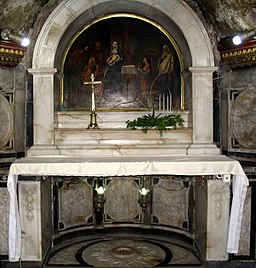__________________________________
Wiki-image by Cgs of Mirror used by CC BY-SA 3.0.
St. Ignatius of Loyola learned to find fruit, that is, the effect or consequence of action. More important than our actions is the action of God in, with and for humans. One grows to find fruit and to offer it the more one savors one's own life and all creation. I hope my posts help you feel that finding fruit is a profitable way of living.
 On the Solemnity of Ss. Peter and Paul, Jesuit Peter Edmonds noted that God's life worked differently in each saint. One verse of Prophet Jeremiah contained two opposite dynamics, and each dynamic described God at work in Peter and in Paul. People may notice in themselves one or other of the divine activity; or, people may notice one at different moments in their lives. Read his ThinkingFaith post.
On the Solemnity of Ss. Peter and Paul, Jesuit Peter Edmonds noted that God's life worked differently in each saint. One verse of Prophet Jeremiah contained two opposite dynamics, and each dynamic described God at work in Peter and in Paul. People may notice in themselves one or other of the divine activity; or, people may notice one at different moments in their lives. Read his ThinkingFaith post.Fox News put up a short unsigned blog headlined "Muslim Brotherhood Takes Egypt, Cleric Declares: 'Our Capital shall be Jerusalem, Allah Willing.'".
Did you know? According to a recent #Pentagon report, there were 154 suicides among active-duty troops in the first 155 days of this year.

The question I am asked often by others in a period of transition...is, “How do I hold on to hope in this time of change?”

 Baptism has united us to Jesus in a vital way: it incorporated us into our risen Messiah. Our Savior, we profess, is seated at the right hand of the Father.1 That is his normal location after his wondrous resurrection and ascension.2 Yet he abides with us in a different and no less real way so we may allow him to nourish and lead us in our lives of faith. Jesus’ sacramental presence invigorates us to be his witnesses everywhere we are.
Baptism has united us to Jesus in a vital way: it incorporated us into our risen Messiah. Our Savior, we profess, is seated at the right hand of the Father.1 That is his normal location after his wondrous resurrection and ascension.2 Yet he abides with us in a different and no less real way so we may allow him to nourish and lead us in our lives of faith. Jesus’ sacramental presence invigorates us to be his witnesses everywhere we are. Preparation times end as do efforts for which they ready us. That leads to John’s other charge. Again the gospel’s final verse: John was in the desert until the day of his manifestation5 to Israel. St. Luke used language of ancient public election to say God propelled God’s chosen prophet to action. John acted until Jesus, his contemporary, appeared after his time of wilderness temptation and faced frustrations about his vocation. When Jesus appeared John stepped aside, saying, [Jesus] must increase, I must decrease.6 John left his popular stage so Jesus could fulfill what John began for him.
Preparation times end as do efforts for which they ready us. That leads to John’s other charge. Again the gospel’s final verse: John was in the desert until the day of his manifestation5 to Israel. St. Luke used language of ancient public election to say God propelled God’s chosen prophet to action. John acted until Jesus, his contemporary, appeared after his time of wilderness temptation and faced frustrations about his vocation. When Jesus appeared John stepped aside, saying, [Jesus] must increase, I must decrease.6 John left his popular stage so Jesus could fulfill what John began for him. 

two Italian newspapers reported that the Vatican will fail an upcoming transparency test by European anti-money-laundering experts while a third claimed the Vatican will pass. While such conflicting accounts are hardly new, the twist is that all three stories contained virtually identical information.



 When we pause to think, Ezekiel’s tree language is not so foreign. We use it to describe the similarity of a child to a parent: “The apple does not fall far from the tree.” Biblical imagery has offered us more than proverbs. A tender shoot of a plant with desired flowers or fruit is the scion grafted to another plant chosen for its roots. The scion contains the genes to produce more flowers and fruit a gardener desires.
When we pause to think, Ezekiel’s tree language is not so foreign. We use it to describe the similarity of a child to a parent: “The apple does not fall far from the tree.” Biblical imagery has offered us more than proverbs. A tender shoot of a plant with desired flowers or fruit is the scion grafted to another plant chosen for its roots. The scion contains the genes to produce more flowers and fruit a gardener desires. God in Jesus by their Spirit works through people. God always exceeds our sophistication as well as our limitations. As a Jesuit I am reminded of the Constitutions of the Society of Jesus. At their beginning and end St. Ignatius of Loyola emphasized that God began, preserves, directs and carries forward the works of what we call our “least Society of Jesus.”2 In our recent province gathering we reminded ourselves of that. We also recalled that we have our parts to play in developing God’s gift to the church and to the world. The Spirit of God needs humans to make its work palpable. We asked, like you and the rest of the members of the body of our risen Messiah, “Are we cooperating with our Creator and Redeemer? Do we use our initiative, like the farmer sowing seed who paid attention to the seasons, and put our resources to better use?”
God in Jesus by their Spirit works through people. God always exceeds our sophistication as well as our limitations. As a Jesuit I am reminded of the Constitutions of the Society of Jesus. At their beginning and end St. Ignatius of Loyola emphasized that God began, preserves, directs and carries forward the works of what we call our “least Society of Jesus.”2 In our recent province gathering we reminded ourselves of that. We also recalled that we have our parts to play in developing God’s gift to the church and to the world. The Spirit of God needs humans to make its work palpable. We asked, like you and the rest of the members of the body of our risen Messiah, “Are we cooperating with our Creator and Redeemer? Do we use our initiative, like the farmer sowing seed who paid attention to the seasons, and put our resources to better use?”
Are you willing to say that if people want to know who’s responsible for this [assessment of the LCWR], the answer is you?
Correct, our congregation is.
It’s a mistake to try to find others to blame for it?Absolutely.